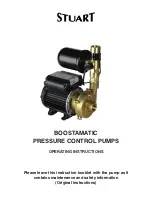
3.4 Calibration
Figure 8: Sample Flow Calibration Curve
All metering pumps must be calibrated to accurately correlate stroke length settings to measured
flow rates.
A typical calibration chart is shown above. Although output is linear with respect to the stroke length
setting, an increase in discharge pressure decreases output uniformly, describing a series of parallel
lines, one for each pressure (only two are shown).
The theoretical output flow rate at atmospheric discharge pressure is based on the displacement of
the diaphragm, stroke length and the stroking rate of the pump. With increasing discharge pressure
there is a corresponding decrease in output flow. Pumps are rated for a certain flow at a rated
pressure (check nameplate). Whenever possible, calibration should be performed under actual
process conditions (i.e., the same or a similar process liquid at system operating pressure).
To construct a calibration chart, measure the flow rate several times at three or more stroke settings
(e.g., 25, 50, 75, and 100), plot these values on linear graph paper, and draw a best-fit line through
the points. For stable conditions, this line should predict settings to attain required outputs.
Note - All users are encouraged to test the flow rate of their pump once installed in their
system, to ensure best accuracy and reliable operation.
4. Maintenance
Before performing any maintenance requiring reagent head or valve (wet end)
disassembly, be sure to relieve pressure from the piping system and, where hazardous
process materials are involved, render the pump safe to personnel and the environment
by cleaning and chemically neutralizing as appropriate. Wear protective clothing and
equipment as appropriate.
Accurate records from the early stages of pump operation will indicate the type and levels of required
maintenance. A preventative maintenance program based on such records will minimize operational
problems. It is not possible to forecast the lives of wetted parts such as diaphragms and check
valves. Since corrosion rates and operational conditions affect functional material life, each metering
pump must be considered according to its particular service conditions.
The PULSA GLM KOPkit
®
will contain all replacement parts normally used in a preventative
maintenance program. It is recommended that KOPkits and PULSAlube
®
9M be kept available at all
times.
7
Summary of Contents for GLM1
Page 4: ......
Page 23: ...8 Dimensional Drawing Dimension table in mm inches 19...










































